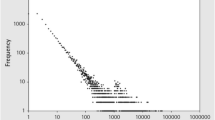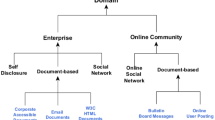Abstract
This paper describes a method for scoring the degree of contribution of each information object and each participant in a cyberspace community, e.g., knowledge management and product reviews, or other information sharing communities. Two types of actions, i.e., information provisioning and information evaluation, are common in such communities and are valuable in scoring each contribution. The EigenRumor algorithm, proposed here, calculates the contribution scores based on a link analysis approach by considering these actions as links from participants to information objects. The algorithm has similarities to Kleinberg’s HITS algorithm in that both algorithms are based on the mutually reinforcing relationship of hubs and authorities but the EigenRumor model is not structured from page-to-page links but from participant-to-object links and is extended by the introduction of several new factors. The scores calculated by this algorithm can be used to identify “good” information and participants who contribute much to a community, which allows for the provisioning of incentives to such participants to promote their continuous contribution to the community.
Access this chapter
Tax calculation will be finalised at checkout
Purchases are for personal use only
Preview
Unable to display preview. Download preview PDF.
Similar content being viewed by others
References
Brin, S., Page, L.: The Anatomy of a Large-scale Hypertextual Web Search Engine. In: Proceedings of 7th International World Wide Web Conference (1998)
Chen, M., Singh, J.P.: Computing and Using Reputations for Internet Ratings. In: Proceedings of the 3rd ACM Conference on Electronic Commerce (2001)
Dellarocas, C.: The Digitization of Word of Mouth: Promise and Challenges of Online Feedback Mechanisms. Management Science 49(10) (2003)
Dellarocas, C.: Immunizing online reputation reporting systems against unfair ratings and discriminatory behavior. In: Proceedings of the 2nd ACM Conference on Electronic Commerce (2000)
Ding, C., He, X., Husbands, P., Zha, H., Simon, H.: PageRank, HITS and Unified Framework for Link Analysis. In: Proceedings of the 25th ACM SIGIR Conference (2002)
Fujimura, K., Nishihara, T.: Reputation Rating System based on Past Behavior of Evaluators. In: Proceedings of the 4th ACM Conference on Electronic Commerce (2003)
Fujimura, K., Tanimoto, N., Iguchi, M.: Calculating Contribution in Cyberspace Community Using Reputation System RuMoR. In: Proceedings of the AAMAS Workshop on Trust in Cyber-societies (July 2004)
Fujimura, K., Inoue, T., Sugisaki, M.: The EigenRumor Algorithm for Ranking Blogs. In: Proceedings of 2nd Annual Workshop on the Weblogging and Ecosystem at the 14th International World Wide Web Conference (2005)
Guha, R., Kumar, R., Raghavan, P., Tomkins, A.: Propagation of Trust and Distrust. In: Proceedings of 13th International World Wide Web Conference (2004)
Iguchi, M., Terada, M., Fujimura, K.: Managing Resource and Servant Reputation in P2P Networks. In: Proceedings of the 37th Hawaii International Conference on System Sciences (2004)
Kamvar, S.D., Schlosser, M.T., Garcia-Molina, H.: The EigenTrust Algorithm for Reputation Management in P2P Networks. In: Proceedings of 12th International World Wide Web Conference (2003)
Kleinberg, J.M.: Authoritative sources in hyperlinked environment. Journal of the ACM 46(5) (1999)
Kollock, P.: The Production of Trust in Online Markets. In: Lawler, E.J., Macy, M., Thyne, S., Walker, H.A. (eds.) Advances in Group Processes, vol. 16. JAI Press, Greenwich (1999)
Sabater, J., Sierra, C.: Regret: A reputation model for gregarious societies. In: Proceedings of the Fourth Workshop on Deception, Fraud and Trust in Agent Societies (2001)
Sabater, J., Sierra, C.: Reputation and Social Network Analysis in Multi-Agent Systems. In: Proceedings of the First International Joint Conference on Autonomous Agents and Multiagent Systems (2002)
Smith, M., Kollock, P. (eds.): Communities in Cyberspace. Routledge, London (1999)
Takahashi, M., Kitayama, S., Kaneko, I.: Measuring and Visualizing Organizational Awareness of Network Communities. IPSJ Journal 40(11) (2001)
Resnick, P., Zeckhauser, R., Friedman, E., Kuwabara, K.: Reputation Systems. Communications of the ACM 43(12) (2000)
Schmitt, B.H.: Experiential Marketing. Free Press (1999)
Whitby, A., Jøsang, A., Indulska, J.: Filtering Out Unfair Rating in Bayesian Reputation Systems. In: Proceedings of AAMAS Workshop on Trust in Agent Societies (2004)
Yu, B., Singh, M.: Detecting Deception in Reputation Management. In: Proceedings of the 2nd International Joint Conference on Autonomous Agents and Multiagent Systems (2003)
AllExpert, http://allexperts.com/
@cosme (In Japanese), http://cosme.net/
Epinions.com, http://www.epinions.com/
Slashdot, http://slashdot.com/
SourceForge, http://sourceforge.net/
Sun Support Forum, http://supportforum.sun.com/
Yahoo! Groups, http://groups.yahoo.com/
Author information
Authors and Affiliations
Editor information
Editors and Affiliations
Rights and permissions
Copyright information
© 2005 Springer-Verlag Berlin Heidelberg
About this paper
Cite this paper
Fujimura, K., Tanimoto, N. (2005). The EigenRumor Algorithm for Calculating Contributions in Cyberspace Communities. In: Falcone, R., Barber, S., Sabater-Mir, J., Singh, M.P. (eds) Trusting Agents for Trusting Electronic Societies. TRUST TRUST 2004 2003. Lecture Notes in Computer Science(), vol 3577. Springer, Berlin, Heidelberg. https://doi.org/10.1007/11532095_4
Download citation
DOI: https://doi.org/10.1007/11532095_4
Publisher Name: Springer, Berlin, Heidelberg
Print ISBN: 978-3-540-28012-5
Online ISBN: 978-3-540-31859-0
eBook Packages: Computer ScienceComputer Science (R0)




